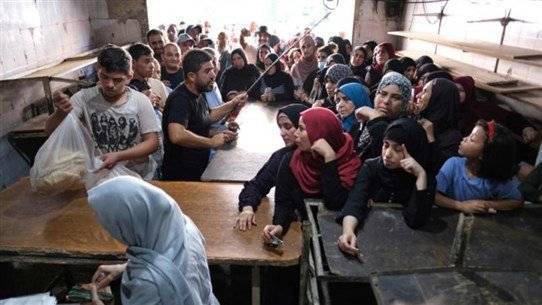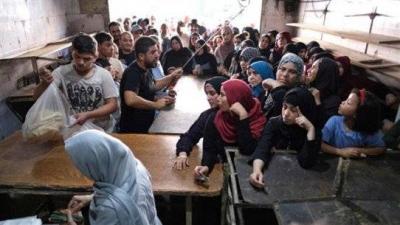An security source summarizes the internal situation by stating that "all the factors that should lead to an internal explosion are present. However, there is no decision, nor are there indications that such a decision will be issued from any internal or external party." Conversely, politicians mention that "the significant collision that was expected to occur since October 17 and the explosion at the port has not happened. The Lebanese people are still exploring the state of the living crisis and adjusting to it, but they have not yet reached the anticipated collision. The fear of this collision intensifies with the approaching political deadlines and the increasing economic and living pressures."
With the recurring scenes of humiliation in front of bakeries and on the brink of a new fuel crisis, and with the worsening severity of the living crisis and strikes alongside threats to not pay public sector salaries, discussions about the possibilities of an internal explosion due to social reasons arise as each crisis escalates. Security officials remain wary of the potential exploitation of worsening crises, which there are no justifications for creating, in a context that everyone knows is not conducive to adding fuel to the fire.
What is encouraging so far is that despite the rising percentage of thefts and crimes, and recording unprecedented poverty rates alongside a gradual deterioration of the conditions of the Lebanese, the reactions have remained security-controlled. At a time when the conditions of security institutions are collapsing and the presence of security and military forces burdened by low salaries and reduced field presence is diminishing, it was expected that the Lebanese arena would explode due to security decay. It was also anticipated that popular arenas would mobilize in rejection of the entire trajectory of living deterioration. However, none of this has occurred. According to security officials, the security situation is still under control compared to everything mentioned, though this does not mean that the elements for an explosion are absent or that their indicators are not high. But compared to past experiences, the decision not to ignite the Lebanese internal situation remains in effect, and no decision has yet been issued to contradict it.
Externally, despite a decline in interest in Lebanon, the stability factor still constitutes some of the guarantees required for regional negotiations, especially concerning arenas more intense than Lebanon, and it remains a need for regional and international parties.
Internally, recent political tensions, at more than one notable juncture, have indicated that everyone still adheres to "security" de-escalation, and ceilings are still contained under the slogan of awaiting a sensitive phase related to the presidential elections. It is noted that the parliamentary elections came to absorb some elements of confrontation that diminished after the results were announced and each party retreated to its own base, dissipating a significant part of the charged atmosphere that was prevailing before mid-May. Moreover, the internal political forces' decision remains bound by external considerations. When such a decision is made, the elements for an explosion will be present.
But how can we prepare for such possibilities, politically and security-wise? The Lebanese arena has been accustomed to being saturated with all forms of regional and international intelligence work; the security forces, which are well aware of this and previously received warnings of terrorist actions through allied devices, know that the ground is suitable if any of these devices wish to create a focal point of tension in Lebanon. Usually, local intelligence operations are prepared and of a high level in following up on any such possibilities. However, the last few years have exacerbated a chronic deficiency in the specialized agencies, despite registering qualitative operations. This is not new, but it has intensified in recent months after financial distress has escalated, impacting the security agencies. Despite ongoing technical aid, foreign donations, and allocated budgetary resources, some have become bloated and their security role diminished, raising questions about how these agencies remain caught between security challenges and economic distress, especially when Lebanon faces looming deadlines at various levels that could suddenly turn into uncalculated confrontations, even outside narrow party frameworks.
In this context, the information security factor is more than necessary, but it is accompanied by economic and living factors. It raises confusion among politicians and security officials alike regarding the underlying secret of ignoring the push towards crises while the political authority promotes campaigns to revitalize the internal situation. Meanwhile, what is happening creates a model of inflaming sentiments at the threshold of political deadlines with the nearing end of the current term and the potential for presidential vacancy, as well as signs of military escalation due to gas exploration. This ongoing fueling of flames socially and economically week after week, in addition to the exacerbation of political problems and divisions that have recently emerged, makes it difficult to contain it amid a chaos that may escape those who are still holding the lines of de-escalation. This represents the peak of the fears, in the absence of any counter-political movement at the level of official references to curb economic and living escalations. Not every time can de-escalation succeed in stopping sectarian, partisan, and social mobilization and in halting deterioration as happened in Tayouneh.




